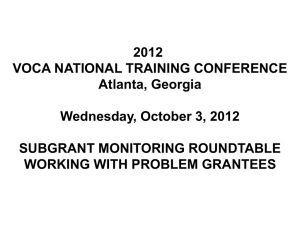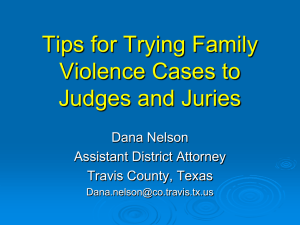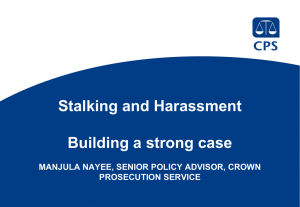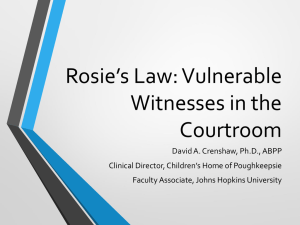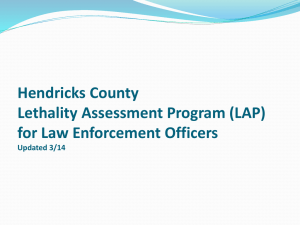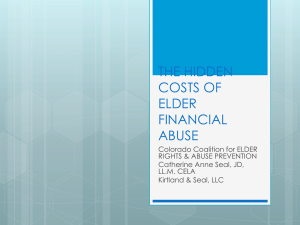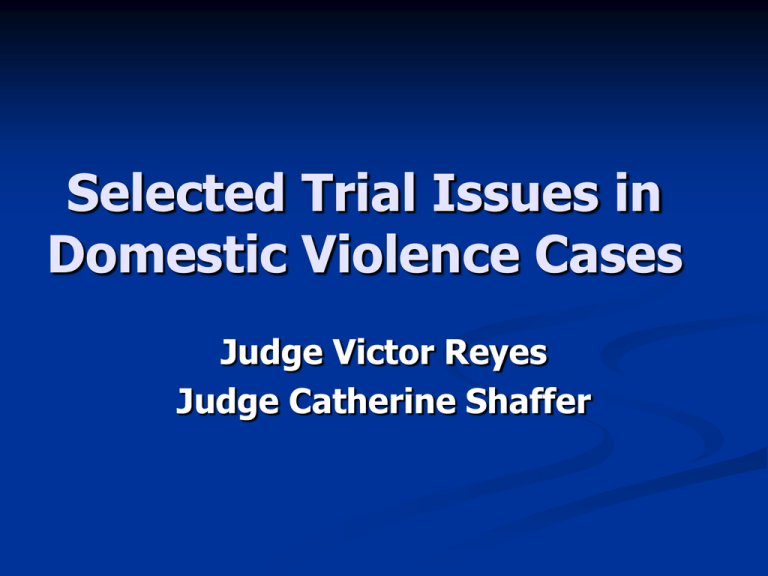
Selected Trial Issues in
Domestic Violence Cases
Judge Victor Reyes
Judge Catherine Shaffer
Learning Objectives
Obtain tools to plan for pretrial
release in DV cases
Discuss appropriate voir dire
approaches in DV cases
Assess how and whether to issue
material witness warrants for alleged
victims in DV cases
More Learning Objectives
Manage DV trials to accommodate
the requirements of victims rights
statutes
Identify effective techniques for
managing pro se defendant requests
for continuances
Pretrial Release
Considerations
Identifying
Lethality
Factors
Effect on bail?
Make victim
referrals?
Other measures?
Bail or alternatives
to confinement
EHD
Day Reporting
Work Release
GPS
Other conditions of
release?
No contact orders
Firearms surrender
LETHALITY FACTORS IN
DOMESTIC VIOLENCE CASES
The Most Dangerous Time
Separation means
greatly heightened
risk of violence
and homicide
First They Talk the Talk
Beware of:
Prior threats to kill
Threatened or actual
use of firearms
Threats of suicide
And They’ve Walked the Walk
Look out for:
Prior episodes of strangling aka
“choking”
Prior forced sex
Obsession
Red flags include:
Violently or constantly jealous
Attitudes of ownership
Victim is center of abuser’s world
More and More
Be alert to
escalation:
In risk-taking
or
In level of abuse
The Gunman
Look out
for access
to
firearms!
Substance Abuse
Likelihood of
lethality is
greater if
drug or
alcohol abuse
is present
Cognitive Problems
Homicide risk increases with:
History of mental illness
Current depression
Victim Predictions
High reliability
when predicting
danger
Low reliability
when denying
danger
Ripped From the Headlines
Mom, Dad and
kids (7-16)
Dad is “strict,”
“controlling” :
wife must ask him
before any
decision
Dad impregnated
mom at 13
07 State
parenting plan
after Dad
commits “minor
assault” on child
Unreported years
of physical, verbal
abuse against
wife, kids
Security guard
Dad has rifle.
Ripped from the Headlines (2)
Mom tried to
leave before, kids
said stay
Mom doesn’t
come home from
work
Dad, with eldest
child, tracks mom
with cellphone
GPS
Mom found with
male “friend.”
Mom and Dad
fight.
Mom says she is
leaving Dad
Dad begs her to
stay, says he’ll
change. She says
no.
Spotting Lethality Factors
What
lethality
factors (if
any) are
present?
PRETRIAL RELEASE IN DV CASE
Hypothetical
Dave Defendant (DD) is charged with
felony violation of a no contact order.
Based on alleged violation of a no contact
order after 2 prior convictions for violation
of NCO (VNCO).
DD appears before you in custody on the
preliminary appearance calendar within 48
hours of his arrest.
PRETRIAL RELEASE IN DV CASE
Hypothetical
FACTS
DD’s criminal history:
DV Violation of NCO 5/25/09
Felony Drug 5/1/09
DV Violation of NCO 8/23/08
DV Assault 7/7/08
A few prior FTAs
PRETRIAL RELEASE IN DV CASE
Hypothetical
Prosecutor argues:
There were at least 2 outstanding NCO’s at
time of incident and DD surely knew of
them.
The neighbor who called police fears DD,
who she says is a known drug dealer.
Prosecutor has not been able to reach the
victim.
PRETRIAL RELEASE IN DV CASE
Hypothetical
Prosecution recommendation:
$25,000 bail.
Maintain treatment at the MH center.
No drugs or alcohol.
No contact order re victim.
No contact with neighbor as
condition of release.
PRETRIAL RELEASE IN DV CASE
Hypothetical
Defense counsel argues:
DD is indigent, disabled and unable to
work.
He lives with his mother.
DD diagnosed as having Bi-Polar disorder.
Started treatment last week at MH center.
Jail is not giving him his medications.
PRETRIAL RELEASE IN DV CASE
Hypothetical
Defense counsel argument continues:
DD is on deferred prosecution for his last
VNCO conviction.
He is currently clean and sober.
As for this incident, he and girlfriend
separated in 2009.
He did not know the order was still in
effect.
He drove by her home wanting to see their
child and a neighbor called police.
PRETRIAL RELEASE IN DV CASE
Hypothetical
Defense recommendation:
PR or EHM release, on condition continued
treatment at the MH center.
No drugs or alcohol.
Do not issue a no contact order as two
already exist.
PRETRIAL RELEASE IN DV CASE
Hypothetical
You order . . .
Voir Dire Issues in DV Cases
Recurring problem – jurors with
personal experiences or special
training
Juror Questionnaire?
If used, managing juror questionnaire
follow up
Seal questionnaires?
Voir Dire in DV Cases (2)
Juror bias in “atypical” DV cases
Judge Zide’s jury: Jury realizes mid trial
that case of parent beating child is “DV’
and feels strong bias
DV cases involving LGBT people,
differently abled people, people from
non US cultures, elder abuse
Your thoughts?
Material Witness Warrants for
Alleged Victims in DV Cases
Why Don’t Some Victims
Cooperate?
Reasons for victim reluctance, refusal
to testify, recantation
Fear of retaliation
Unwillingness to face perpetrator
Shame and/or guilt
Desire to forget, move on
Denial, withdrawal, emotional mood
swings
i.e. symptoms of trauma
The Victim’s Reality
Perpetrator may
be
Living with
victim
Familiar with
victim’s routine
Have ongoing
access
The Victim’s Reality (2)
Fear may be more than theoretical,
e.g. follow from escalating violence
Perpetrator may be maintaining
coercive control: alternating
affection and threats/violence
Children in common
Ongoing child visitation
Fear for safety of children
Fear of loss of custody
The Victim’s Reality (3)
Economic dependence. I.e.
incarceration means loss of support.
Lack of employment skills
Lack of housing
Inability to pay for civil legal proceedings or
counsel
Victim may be economically or
otherwise responsible for perpetrator
The Victim’s Reality (4)
Fear of loss of
community or
family support
Lack of existing
support because
of isolation
The Victim’s Reality (5)
Victim belief that
system will not
help to stop
violence or
protect
Past experience
Perpetrator
statements and
actions
Victims in Court
Victims look to
immediate effect
on their safety
and relationship
Victim
perspective is
day to day
Victim
Ambivalence
Effect of
proceeding on
relationship,
family, finances
Success if
violence stops
even if no
sentence
Victims in Court (2)
Lack of confidence in court system
Procedural delay
Complexity
Discourteous court staff
Misinformation
Court order violations
Failure of system response e.g. no
arrest, no prosecution, no court sanction
So What Should Courts Do?
If witness was
subpoenaed
court may
consider
Continuance
Material witness
warrant
Contempt
Beware of
revictimization
Alternatives e.g.
safety
assurances
Negotiating
solutions short of
jailing the victim
Victim
Rights
What Do Statutes Require?
Notice about scheduling, disposition
A secure waiting area
Return of property when no longer
needed
In violent/sex crimes, advocate or
support person to be present
Right to be present at trial
Input into sentencing
Other Statutory Rights
Prosecutor must make “reasonable
efforts” to notify victim of nature of
and reasons for plea agreement, and
obtain victim objections/comments
on plea
Court must be told of crime victim’s
objections to/comments on proposed
plea
More Statutory Rights: Child
Witnesses
Explanations in easily understood
language
Advocate
Secure waiting area
Very limited disclosure of name,
address, photos
Appropriate social service referrals
Other Statutory Rights
Requests for victim counseling
records
Requests for advocate records
Requests for medical and
pharmaceutical records
Your Jurisdictions?
What practices do you recommend ?
Pro Se Defendants
What do you do if a pro se defendant
in a DV case requests a continuance?
Other suggestions on dealing with
pro se defendants in DV cases?
BEST PRACTICES:
COURTROOM MANAGEMENT
Maintaining
safety and
control:
Keep
parties
separated
Consider court
security
Consider using
advocates
Control parties’
presentations
Thank you!


